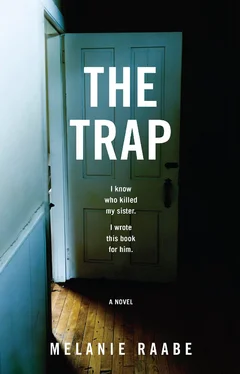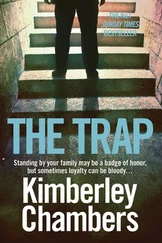“Please, call me Sophie.”
Jonas knew that he should send her away; it was impertinent of her to come and waylay him in private like this. He should send her away, go inside, have a shower and forget all about this curious encounter.
Instead he sat down.
“All right then: Sophie. What are you doing here?”
She seemed to reflect for a moment.
“I’d like to know what happens next,” she said.
“I’m sorry?”
“You asked me what I’m doing here. I’m here to ask you what happens next. In the…” She faltered. “In the case.”
Jonas contemplated the young woman beside him, shrouded in cigarette smoke, her long legs bent like a wounded grasshopper’s, one arm flung around her body, as if she felt cold in spite of the summer heat.
“Shouldn’t we discuss this in my office tomorrow?” he asked, knowing he was going to have to take a firmer line if he really wanted to get rid of her.
Then why don’t I? he wondered.
“Now that I’m here, we might as well talk.”
“I don’t know what to say,” Jonas said with a sigh. “We’ll continue to gather all the evidence we can. We’ll take a very close look at what forensics say. We’ll talk to a great many people — we’ll do what we can. That’s our job.”
“You’ll find the murderer,” Sophie said. It was not a question.
Jonas grimaced. What had he gone and promised her? He should have got a grip on himself. The scene of the crime was a forensic nightmare. Only a few nights before her death, Britta Peters, the murder victim, had hosted a birthday party in her flat for a friend — a party that had been attended by almost sixty people. Almost sixty people who’d left enormous quantities of fingerprints and traces of DNA all over the flat. If the identikit picture didn’t yield anything and the victim’s acquaintances couldn’t come up with any relevant evidence, it was going to be tricky.
“We’ll do our best,” said Jonas.
Sophie nodded. She took a drag on her cigarette.
“Something wasn’t right in Britta’s flat,” she said. “I can’t work out what it was.”
Jonas knew that feeling — like a low note that you hear not with your ears but with your belly.
“Can I have one too?” he asked. “A cigarette, I mean.”
“This is my last. But you can have a drag.”
Jonas took the lit cigarette that Sophie held out to him. Her fingertips brushed his. He took a deep drag and returned the cigarette. Sophie raised it to her mouth.
“I think Britta was an accidental victim,” she said.
“May I ask why you think that?”
“No one who knew her could have done a thing like that,” Sophie said. “No one.”
Jonas was silent. Again he accepted the cigarette that Sophie held out to him, took a drag, gave it back. Sophie stubbed it out in silence. She sat there beside him, staring into the darkness.
“Can I tell you about Britta?” she asked eventually.
Jonas didn’t have the heart to say no. He nodded. Sophie was silent again, for a while, as if wondering where to begin.
“Once, when Britta was five or six, we went up to town with our parents,” she began at length. “We were walking along the street with ice-cream cones in our hands — it was summer; I remember it like yesterday. Sitting on the pavement was this homeless man, dressed in rags caked with dirt, a mangy dog beside him, and bottles in a shopping trolley. We’d never seen a homeless person. I was appalled, because he smelled so bad and looked so ill and because I was scared of his dog. But Britta was curious; she said something to him—‘Hello, mister’ or something — the kind of thing children say to strangers sometimes. The man grinned at her and said, ‘Hello, young lady.’ My parents hurried us past him, but somehow Britta couldn’t get the man out of her head. She went on pestering my parents with her questions for hours afterward. What was the matter with the man and why did he look so funny and why had he talked so funny and smelled so funny? My parents told her that the man was probably ill and didn’t have a home. From then on, whenever we went up to town with my parents, Britta would pack some food to take with her, and always looked out for him.”
“Did she find him?”
“No. But it wasn’t just that man, you know. I can’t begin to tell you how many injured animals Britta brought home for our parents to help nurse back to health. When Britta was twelve she started work as a volunteer in an animal refuge. Since moving into town she’s worked in a soup kitchen for the homeless. She never forgot that man, you see?”
Jonas nodded. He tried to imagine her alive, the delicate blonde woman now lying in forensics, tried to imagine her running around, going about her everyday life, talking to her sister, laughing. But he couldn’t. He’d always found it impossible to imagine murder victims alive. He never got to know them in life, only ever in death, and with his weak powers of imagination he was unable to envisage anything else.
“It’s so easy to ridicule,” Sophie said. “It’s so easy to belittle people like Britta — to call them do-gooders. But Britta really was that way: not a do-gooder, but someone who actually did good.”
Jonas looked at her, trying to picture her together with her sister. The two women were so unalike — the delicate, elfin Britta, with her long hair and who, in all the photos he’d seen of her, emanated shyness and fragility; and Sophie, with her short hair and boyish appearance, who seemed so tough in spite of all she was going through.
“Stabbed seven times,” Sophie said, and Jonas started. “I saw it in the paper. Can you imagine what it did to my parents, reading that?” she asked.
Jonas nodded his head automatically — and then shook it. He couldn’t, not really.
“You have to find him,” Sophie said.
Jonas looked at her. The light, which had been triggered by the motion detector when he’d approached the house, went out. Sophie’s eyes gleamed in the dark. For a second, Jonas felt himself sinking into them. Sophie returned his gaze. Then the moment passed.
“I’d better be going,” she said abruptly, and stood up. Jonas stood too. He picked up her leather bag from the steps and handed it to her.
“God, it’s heavy. What have you got in there? Weights?”
“Books,” Sophie replied, swinging the bag over her shoulder. “I find it comforting always having something to read with me.”
“I can understand that,”
“Really? Do you like reading too?”
“Well, to be honest, I don’t know when I last picked up a book,” Jonas said. “I don’t have the patience for novels. I used to be obsessed with poetry. Verlaine, Rimbaud, Keats — anything in that line.”
“Oh God,” Sophie groaned. “Right from being at school I couldn’t stand poetry. If I’d had to recite Rilke’s ‘The Panther’ one more time in Year Nine, I think I’d have gone crazy. ‘Its gaze, from pacing by the passing bars / Is so worn out that it can hold no more…’”
She shuddered in mock horror. Jonas had to grin.
“You’re unfair to good old Rilke,” he said. “Who knows, maybe one day I’ll try to convince you to give poetry another chance. You might like Whitman, or Thoreau.” Even as he said the words, he cursed himself. What was he doing?
“I’d like that,” said Sophie. She turned to leave.
“Thank you for your time. And sorry for bothering you.”
She disappeared into the night. Jonas watched her go for a moment. Then he turned back and climbed the steps to the front door.
He paused in amazement.
The diving-bell feeling had vanished.
My muscles are on fire. I’m determined to prepare myself as well as I can for D-Day. Apart from anything else, that means physical training. If I’m to stand a chance of holding out in a situation of extreme stress, I must prepare myself physically as well as mentally. A well-trained body can cope better, so I’m working out. For years there’s been a fitness studio in my basement that I hardly ever use. I was plagued with backaches for a time, and got the better of it with the help of a personal trainer and disciplined weight training. Apart from that, I have never had much reason to bother about my body. I’m pretty slim and relatively fit and I couldn’t care less about my bikini figure. In my world, there are no beaches.
Читать дальше












